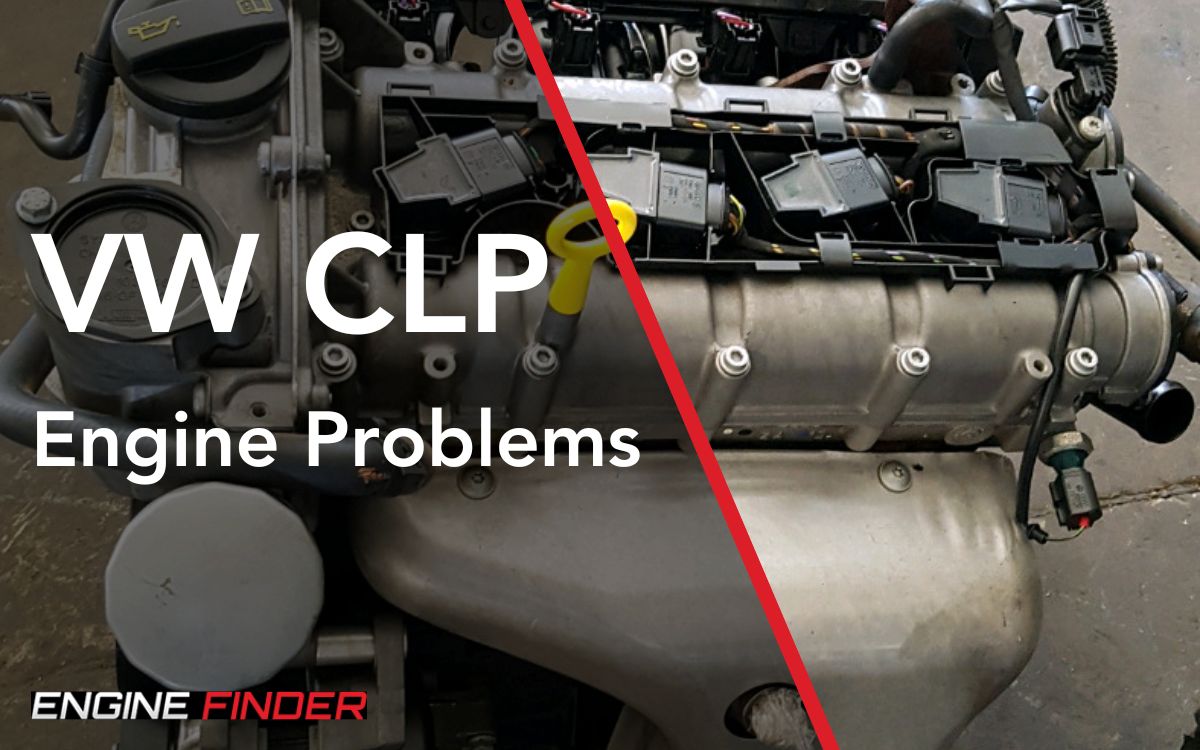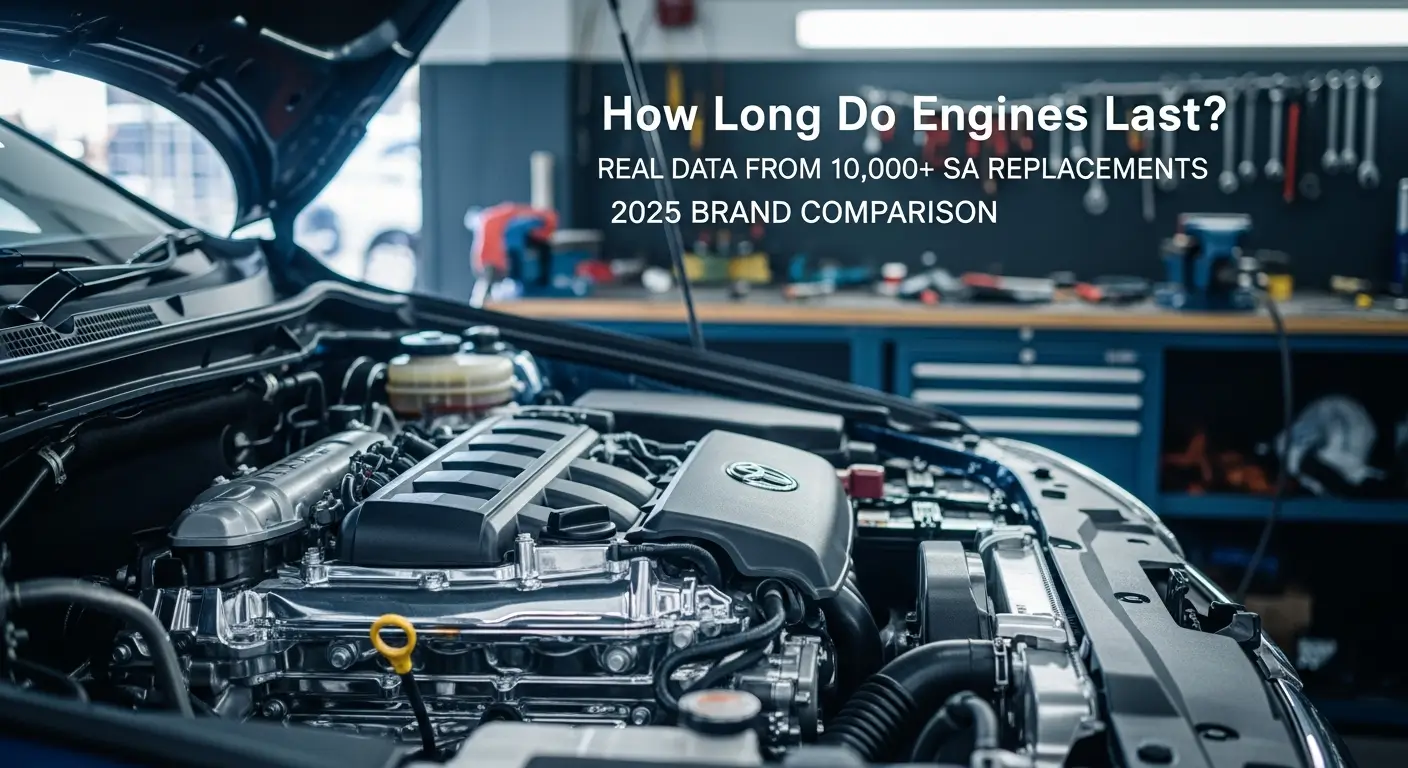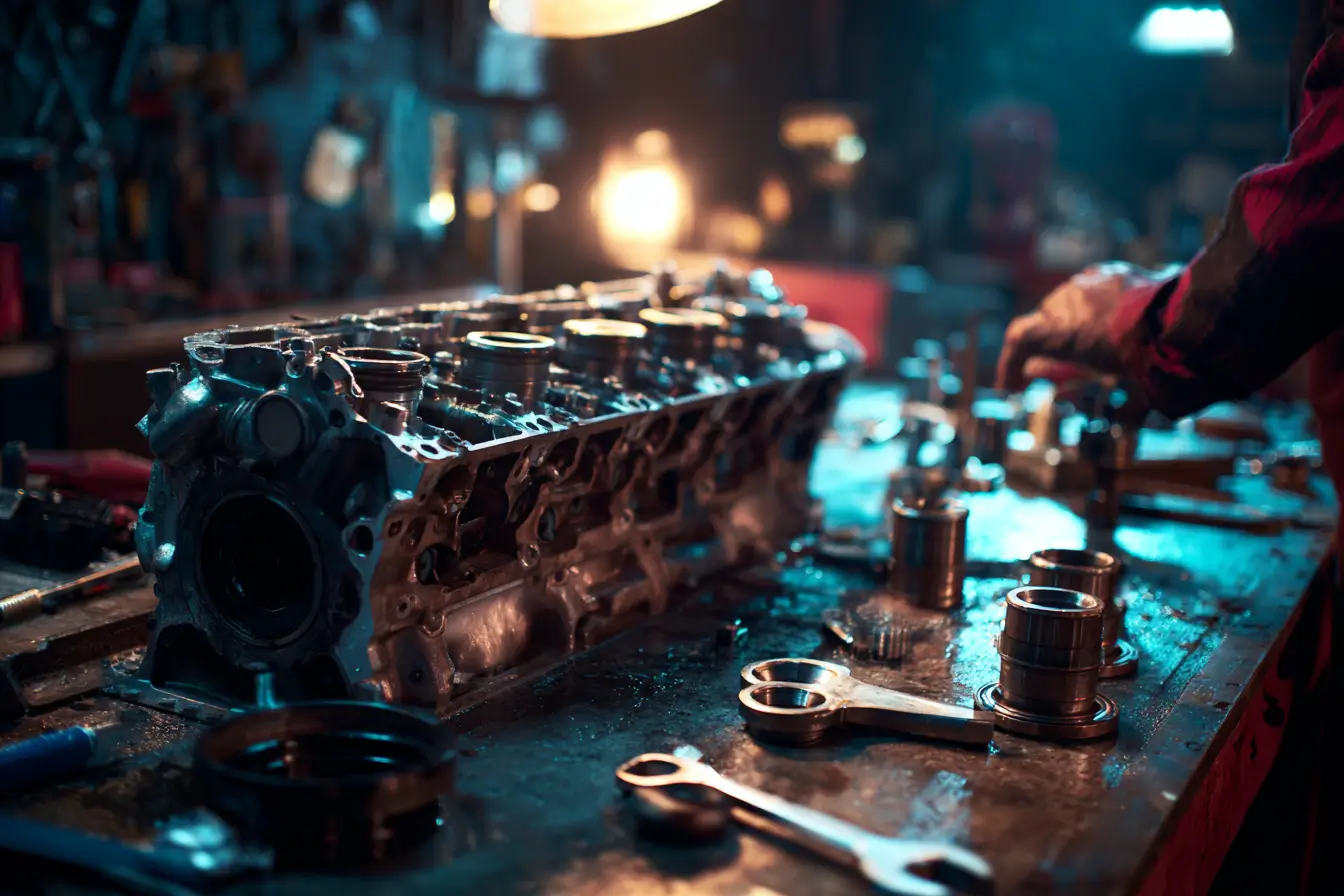
VW CLP Engine Problems: Complete Polo 1.4 Troubleshooting Guide
Key Takeaways
| Problem | Main Symptoms | Possible Causes |
|---|---|---|
| PCV System Failure | Erratic idle, strong vacuum at oil cap | Clogged PCV valve, damaged hoses |
| Engine Overheating | High temperature, coolant loss | Water pump failure, radiator blockage |
| Head Gasket Failure | White smoke, coolant loss, oil contamination | Overheating, poor maintenance |
| Fuel System Faults | Fuel leaks, poor performance | Worn injectors, fuel pump failure |
| Oil Leaks | Oil stains, burning smell | Worn gaskets, damaged seals |
| Timing Chain Issues | Rattling noise, poor timing | Chain stretch, tensioner failure |
🔧 Equipment Needed: OBD scanner, pressure tester, basic tools
💰 Diagnostic Cost: R450-R750 for professional diagnosis
⏱️ Repair Time: 2-8 hours depending on problem complexity
Overview
The Volkswagen CLP engine is a 1.4-liter naturally aspirated petrol engine commonly found in VW Polo models from 2001-2009. While generally reliable, this engine experiences specific problems that owners should understand for proper maintenance and cost-effective repairs.
VW CLP Engine Specifications
| Specification | Details |
|---|---|
| Engine Code | CLP (1.4L 8V) |
| Displacement | 1,390cc |
| Configuration | Inline 4-cylinder |
| Valvetrain | SOHC 8-valve |
| Power Output | 55kW (75hp) @ 5,000 rpm |
| Torque | 126 Nm @ 3,800 rpm |
| Compression Ratio | 10.3:1 |
| Applications | VW Polo 9N, 9N2, 9N3 |
Equipment Needed for CLP Diagnostics
- OBD-II Scanner: For reading fault codes (R800-R2,500)
- Pressure Tester: For cooling system testing (R400-R800)
- Compression Tester: For cylinder health assessment (R350-R750)
- Basic Tools: Socket set, wrenches, screwdrivers (R400-R800)
- Multimeter: For electrical testing (R200-R500)
1. PCV System Failure
Causes
- Clogged PCV valve from carbon buildup
- Damaged or split breather hoses
- Blocked crankcase ventilation passages
- Worn valve cover gasket allowing vacuum leaks
- Carbon deposits in intake manifold
Symptoms
- Erratic idle when oil filler cap is removed
- Strong vacuum sensation at oil filler opening
- Excessive oil consumption
- Oil leaks from various engine seals
- Rough idle and poor engine performance
Solution
- Replace PCV valve and breather hoses (R150-R350)
- Clean crankcase ventilation passages
- Replace valve cover gasket if damaged (R300-R650)
- Clean carbon deposits from intake manifold
- Inspect and replace damaged vacuum lines
DIY Difficulty / Hours
- PCV valve replacement: Easy / 0.5-1 hour
- Breather hose replacement: Easy / 1 hour
- Valve cover gasket: Moderate / 2-3 hours
- Professional PCV service: R650-R1,200
PCV System Tip
Test PCV function by removing the oil filler cap while engine idles. You should feel slight suction, not strong vacuum or pressure. Strong vacuum indicates PCV valve failure.
2. Engine Overheating
Causes
- Water pump impeller failure or bearing wear
- Thermostat stuck closed or opening late
- Radiator core blockage from debris or corrosion
- Coolant leaks from hoses or connections
- Electric cooling fan malfunction
Symptoms
- Temperature gauge reading above normal
- Steam from engine bay
- Coolant puddles under parked vehicle
- Poor cabin heater performance
- Engine knocking or pinging under load
Solution
- Replace water pump and thermostat (R800-R1,500)
- Flush radiator and replace if blocked (R1,200-R2,800)
- Repair coolant leaks and replace hoses (R200-R600)
- Test and replace cooling fan if faulty (R450-R850)
- Bleed cooling system properly after repairs
DIY Difficulty / Hours
- Thermostat replacement: Moderate / 1.5-2 hours
- Water pump replacement: Difficult / 4-6 hours
- Radiator replacement: Moderate / 2-3 hours
- Professional cooling system service: R1,500-R3,500
Overheating Warning
Never drive with an overheating CLP engine. The aluminum cylinder head can warp quickly, leading to expensive head gasket replacement or complete engine failure.
3. Head Gasket Failure
Causes
- Engine overheating causing head warpage
- Poor maintenance leading to corrosion
- Incorrect torque specifications during previous repairs
- Age-related gasket material deterioration
- Coolant system pressure spikes
Symptoms
- White smoke from exhaust (especially when cold)
- Coolant loss without visible external leaks
- Milky oil on dipstick or oil cap
- Bubbles in coolant reservoir
- Engine misfires and rough running
Solution
- Cylinder head removal and inspection (R2,500-R4,500)
- Machine cylinder head if warped (R800-R1,500)
- Replace head gasket with updated version (R350-R650)
- Replace head bolts with new items (R200-R400)
- Pressure test cooling system after assembly
DIY Difficulty / Hours
- Head gasket replacement: Very Difficult / 8-12 hours
- Professional head gasket service: R6,000-R12,000
- Requires specialized tools and expertise
- Machine shop services additional cost
4. Fuel System Faults
Causes
- Fuel injector clogging from poor fuel quality
- Fuel pump wear from contaminated fuel
- Fuel filter blockage from debris
- Fuel pressure regulator malfunction
- Fuel rail or line corrosion
Symptoms
- Poor acceleration and power loss
- Engine hesitation or stumbling
- Difficult starting, especially when hot
- Fuel odor in vehicle or engine bay
- Visible fuel leaks under vehicle
Solution
- Replace fuel filter every 40,000 km (R150-R300)
- Professional fuel injector cleaning (R200-R400 per injector)
- Replace fuel pump if pressure inadequate (R800-R1,500)
- Repair fuel line leaks immediately (R200-R800)
- Replace fuel pressure regulator if faulty (R300-R650)
DIY Difficulty / Hours
- Fuel filter replacement: Moderate / 1 hour
- Fuel pump replacement: Difficult / 3-5 hours
- Injector cleaning: Professional service recommended
- Professional fuel system service: R1,200-R2,800
Fuel Quality Tip
Use fuel additives monthly and avoid filling up at stations with obvious contamination. Poor fuel quality is the leading cause of CLP fuel system problems.
5. Oil Leak Problems
Causes
- Worn valve cover gasket from heat cycling
- Deteriorated oil pan gasket
- Failed crankshaft or camshaft seals
- Loose oil drain plug or damaged threads
- Worn oil cooler seals (if equipped)
Symptoms
- Dark stains under parked vehicle
- Burning oil smell during operation
- Oil level dropping between changes
- Smoke from engine bay
- Oil residue on engine surfaces
Solution
- Replace valve cover gasket (R250-R500)
- Replace oil pan gasket if accessible (R400-R800)
- Replace main seals if severely leaking (R1,500-R3,000)
- Retorque oil drain plug with new washer (R25-R50)
- Clean engine and monitor leak sources
DIY Difficulty / Hours
- Valve cover gasket: Moderate / 2 hours
- Oil pan gasket: Difficult / 3-4 hours
- Crankshaft seal: Very Difficult / 5-8 hours
- Professional leak repair: R800-R2,500
6. Timing Chain Problems
Causes
- Timing chain stretch from high mileage
- Worn timing chain tensioner
- Insufficient oil changes causing chain wear
- Guide rail wear or breakage
- Oil pump drive chain issues
Symptoms
- Rattling noise from engine, especially on startup
- Poor engine performance and timing
- Engine may jump time under load
- Metallic noise from timing cover area
- Possible engine damage if chain breaks
Solution
- Replace timing chain kit including tensioner (R1,200-R2,500)
- Replace guide rails and tensioner arms (R400-R800)
- Ensure proper oil pressure before reassembly
- Check camshaft and crankshaft timing
- Use quality engine oil after repair
DIY Difficulty / Hours
- Timing chain replacement: Very Difficult / 6-10 hours
- Professional timing chain service: R3,500-R7,000
- Requires engine support and specialized tools
- Critical timing procedures required
Timing Chain Warning
If the timing chain breaks, it can cause severe valve damage in this interference engine. Address rattling noises immediately to prevent catastrophic failure.
Diagnostic Video Guide
Preventative Maintenance Tips
Regular Service Schedule
| Service Type | Interval | Components |
|---|---|---|
| Engine Oil Change | Every 10,000 km | Oil, filter, drain plug washer |
| Air Filter | Every 20,000 km | Engine air filter replacement |
| Spark Plugs | Every 40,000 km | Inspect and replace as needed |
| Coolant System | Every 60,000 km | Flush, thermostat, hoses |
| Timing Chain | Every 100,000 km | Inspection and replacement if needed |
Critical Maintenance Items
- Use Quality Oil: VW 502.00/505.00 specification oil only
- Regular PCV Maintenance: Clean system every 30,000 km
- Monitor Coolant: Check level and condition monthly
- Quality Fuel: Use reputable stations and additives
- Professional Inspections: Annual comprehensive checks
FAQ
How reliable is the VW CLP engine?
The CLP engine is generally reliable with proper maintenance. Most problems occur due to neglected maintenance or overheating. With regular servicing, these engines can reach 200,000+ km.
What’s the most common CLP engine problem?
PCV system failure is the most common issue, causing erratic idle and oil leaks. Regular PCV maintenance every 30,000 km prevents most problems.
Is the CLP engine interference or non-interference?
The CLP is an interference engine. If the timing chain breaks, valves can contact pistons, causing expensive internal damage. Address timing chain noise immediately.
How much does CLP engine maintenance cost annually?
Budget R3,000-R6,000 annually for routine maintenance. Major repairs like head gaskets or timing chains can add R6,000-R12,000 to costs.
Can I use any engine oil in the CLP?
Use only VW 502.00 or 505.00 specification oil. Incorrect oil can cause timing chain stretch and PCV system problems. 5W-30 or 5W-40 viscosity recommended.
When should I replace the timing chain?
Replace the timing chain if you hear rattling noises, especially on startup. Preventive replacement around 150,000-200,000 km is recommended for high-mileage engines.
Conclusion
The VW CLP engine provides reliable service when properly maintained and common problems are addressed promptly. Understanding these issues and following preventive maintenance schedules can significantly extend engine life and prevent expensive repairs.
Regular attention to the PCV system, cooling maintenance, and quality oil changes are key to CLP engine longevity. When major repairs become necessary, Engine Finder provides access to quality VW Polo engines for sale and professional automotive services across South Africa.
References and Further Reading
Technical Resources
Community Resources
Professional Services
Related Articles
Explore more insights on similar topics

How Long Do Engines Last on Average? Complete Longevity Guide
Understand real-world engine lifespan ranges, warning signs, lifecycle stages, costs, and maintenance best practices for South African drivers.

How Does an Engine Overhaul Work? Complete Guide to Engine Rebuilds
Learn everything about engine overhauls: types, warning signs, process, costs, and when to rebuild vs replace your engine in South Africa.
.webp)
Timing Chain vs Timing Belt: Complete Guide to Cambelt Replacement & Lifespan
Learn everything about timing chains and timing belts (cambelts): differences, lifespans, replacement costs, and which is better for your engine in South Africa.
Important Disclaimer
This content is for informational purposes only and is based on research from automotive industry sources. Engine Finder is not a certified automotive repair facility. Always consult with qualified automotive professionals before performing any repairs or maintenance. Improper repairs can result in personal injury, property damage, or vehicle malfunction. We assume no responsibility for actions taken based on this information.
